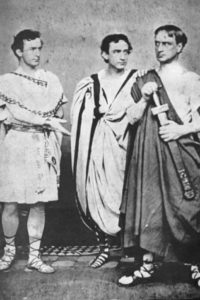You may have noticed this week that Caitlin Griffin’s 2012 “Everbody Dies” poster has gone viral (again) this week. Caitlin’s been a reader/contributor to this blog for quite some time, so if you’re talking about that graphic please make sure to give her the proper credit and links!
Of course with that much Shakespeare content all in one place it’s got to stir up some conversation. I was curious about “The Fool just disappears”. I thought he was hanged? I went back to the text:
Lear. And my poor fool is hang’d! No, no, no life!
Why should a dog, a horse, a rat, have life,
And thou no breath at all? Thou’lt come no more,
Never, never, never, never, never!
Pray you undo this button. Thank you, sir.
Do you see this? Look on her! look! her lips!
Look there, look there!
And then Lear dies. It’s even in Sir Ian McKellen’s version of King Lear that came out on video a few years ago. Not the quote, the quote’s always there – I mean you witness Fool being hanged in that one. (Found a link!)
But I asked Bardfilm and he pointed me to the Arden footnotes (and I mean that literally, he messaged me a picture of him pointing to the footnote) that says Lear is referring affectionately to Cordelia (who, obviously, was hanged). It seems odd that all of a sudden he’d pull out a pet name for his daughter that wasn’t used previously in the play, that also happens to be the name of a character. But, the footnotes argue, Lear is basically confusing the two characters at this point and thinks them to be the same person. (I imagine this to be much like when you visit a relative who suffers from Alzheimer’s and discover yourself being called by the name of someone long dead).
Until right now I’d just always assumed that the fool was hanged, possibly even right in front of him. I don’t know when or where or how (it’s strangely awkward in the McKellen version, and really dark), but it just always seemed to me like one more sorrow to be heaped upon us. After all, what exactly did the fool do to deserve hanging? He’s not even a soldier who could or would have defended himself. It’s like hanging a child. I just always imagined Lear having to watch his fool die.
What do you all think? Isn’t Shakespeare typically better at tying up his loose ends? Would he have just forgotten to tell us the fate of that character? Or is this his way of finding a place to squeeze it in? Have you just always read it as referring to Cordelia?
We can talk about whose button it is later. 🙂

 I wonder if somebody confused “drums of war” for “dogs of war” when they attributed this quote to Julius Caesar? Nothing about this quote shows up in the play, of course. I suppose there’s at least some possibility that it appears in actual Caesar’s actual writings, since I’m not an expert in those. But others before me have researched this question and apparently nope, not real Caesar either. This quote doesn’t appear to exist before 2001.
I wonder if somebody confused “drums of war” for “dogs of war” when they attributed this quote to Julius Caesar? Nothing about this quote shows up in the play, of course. I suppose there’s at least some possibility that it appears in actual Caesar’s actual writings, since I’m not an expert in those. But others before me have researched this question and apparently nope, not real Caesar either. This quote doesn’t appear to exist before 2001.